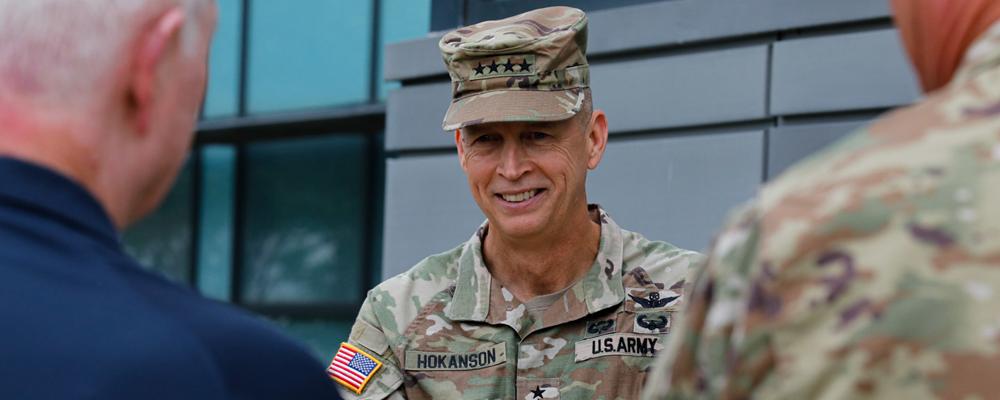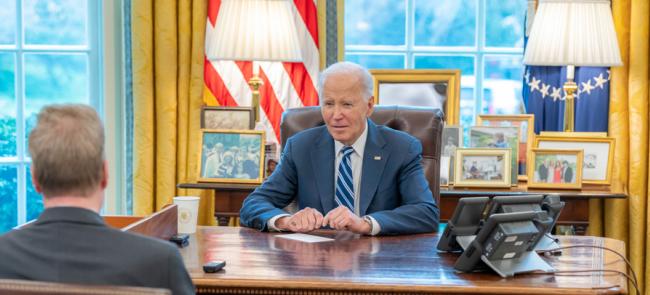
From the Chief: Family Readiness
We often talk about the dual nature of National Guard service — how we’re citizen-soldiers and citizen-airmen — but that’s only a fraction of our identity. We are also spouses, parents and siblings — and our families are essential to our ability to serve.
Family members may not wear a uniform, but they all serve and sacrifice in their own way. They have a say in our career decisions, like whether we apply for a job with the National Guard Bureau or whether we continue to stay in the Guard at all. They cope with our absence, whether it’s for a training weekend or a year-long deployment. They too bear the burden of our time apart.
Family members may not wear a uniform, but they all serve and sacrifice in their own way.
I remember picking up my son from practice on my way home from work shortly after returning from a deployment to Afghanistan with the Oregon National Guard. We stopped at the store to get a few things for dinner, and as we walked out, someone saw me in uniform and said, “Thank you for your service.” After they said it, my son squeezed my hand tightly, looked at me and said, “I didn’t know they knew you were gone.”
Like thousands of other deployed dads, moms, brothers, sisters, sons and daughters, I wasn’t there to watch my three children play sports, to pick them up after school, to sit down and talk or read to them or kiss them good night.
That’s the story for a lot of Guard families. We aren’t like active-duty families who live on or near a base with a built-in support network. When you’re in the Guard, yours may be the only family in the community who serves, or the only family with a loved one deployed.
It isn’t always easy to be a Guard family; it takes support, patience, strength and, sometimes, a lot of extra effort. But these efforts are worth it: Preparing your family to be ready for training, events or a deployment is a critical factor in both your personal success and the success of the mission. Knowing your family is prepared for your absence can give you and your loved ones peace of mind, improving morale and allowing you to focus on the task at hand. This is another way our Guard families are force multipliers for our success.
You don’t have to do this alone. All across the 54, there are family programs that help Guard families navigate all manner of challenges. Whether you’re figuring out complicated health care forms, planning your family’s financial future, preparing for a deployment or just need to talk to someone who understands, the National Guard’s Family Programs are there to help.
Every state, territory and the District of Columbia has a family program director or an Airmen and Family Readiness Program manager. Each of them oversees a team of subject matter experts and volunteers whose entire job is to help our Guard teammates and their families. They can assist you with understanding and accessing the vast and complex universe of military benefits and entitlement programs, connect military kids with fun and informative programs and opportunities, refer families to wellness programs and connect Guard families with a wide variety of other helpful resources.
You can find the Family Assistance Center nearest you by visiting www.militaryonesource.mil/resources/tools/national-guard-family-program-lookup.
Family readiness isn’t just planning and paperwork; it’s also play. Encourage your family members to participate in family-related unit activities, get to know other Guard families and help build our Guard community. These networks can support and sustain families and help enhance resilience.
Building your family’s readiness doesn’t happen overnight — it’s a constant process that involves assessing your family’s unique and evolving needs. It starts long before a drill weekend or a deployment and continues even after your homecoming celebration. But it begins with a conversation about what to expect, how you and your family feel and who to call if you need help. We are here to help you and your family be ready, so we can uphold our promise to be “Always Ready, Always There.”
The author is chief of the National Guard Bureau and a member of the Joint Chiefs of Staff.



